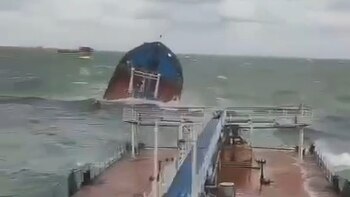
After the start of Holy Week in Colombia, the Corporation for Sustainable Development (Coralina), the organization responsible for the conservation of marine fauna in the San Andrés archipelago, called on residents and tourists not to feed the sharks that inhabit the area, as they not only affect the ability to hunting for them, but also jeopardize the physical integrity of bathers.
The director of Coralina, Arne Britton González, reiterated the call to not bait sharks on the island, after a video circulated on social media in previous days showing a person feeding the species in Johnny Cay Regional Park.
Faced with the facts, Britton informed the community that feeding marine species such as sharks, rays and chimeras, affects them biologically because they create dependence on their diet, since they lose their natural hunting ability.
You can also read: So you can enjoy the tables during this Easter with the Alternative Theatre Festival
In addition, the director of Coralina indicated that feeding these marine species also puts the physical integrity of bathers in that island territory at risk due to their proximity to the shores of the beach.
It should be noted that, according to information obtained by Blu Radio, it is common for tourists arriving in that Colombian island area to pay guides or islanders to use the food as bait to attract sharks to the shores of the beach, so that photos can be taken with this kind of background and then shared. on social networks.
You can also read: Bogotá expects more than 200,000 visitors during Easter with a wide tourist and religious agenda
Regarding the people who were recorded feeding sharks in Sound Bay, the director of Coralina reported that they have already been identified and that, together with the Attorney General's Office, they work together to carry out the respective prosecution.
“In addition, an environmental awareness process was activated with fishermen and locals, to raise awareness and prevent these bad practices from continuing to occur due to ignorance,” concluded the corporation.

On April 8, the Coral Corporation also announced that dead algae, better known as Sargassum (Sargassum), were having an impact on the shores of the San Andrés archipelago, so they had to coordinate a meeting with the government of the department through the Secretary of Public Services and the Environment Ambiente, Trash Buster and the Masbosques Corporation, in order to seek solutions to this problem.
According to the deputy director of seas and coasts of Coralina, Gilberto Myles, at the meeting he determined that machinery would be available to remove algae and bury them, as well as to take advantage of and clean the archipelago's beaches.
The deputy director of the seas of Coralina also announced that they will also ask the island's tourist associations to link to this type of action to remove these natural wastes, which are evident every year in the Caribbean Sea.
KEEP READING
Últimas Noticias
Debanhi Escobar: they secured the motel where she was found lifeless in a cistern

The oldest person in the world died at the age of 119

Macabre find in CDMX: they left a body bagged and tied in a taxi
The eagles of America will face Manchester City in a duel of legends. Here are the details

Why is it good to bring dogs out to know the world when they are puppies



